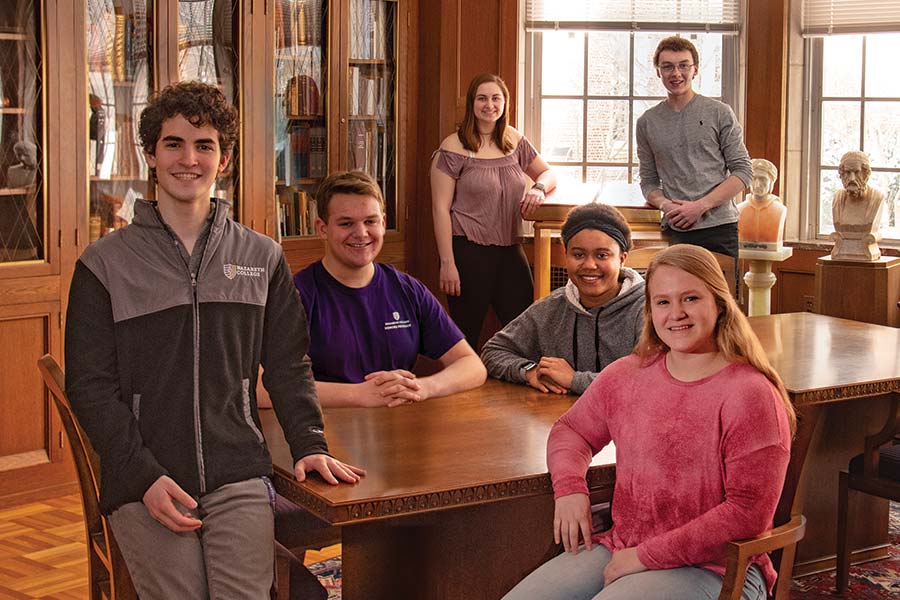ACADEMICS
Enhancing the Honors Program
New directors add global and engagement options and community-building
by Rochelle Ruffer and Rachel Bailey Jones

Current honors students: In back, Jocelyn Anctil (social work and dance) and Dereck Atwater (musical theater). Front row: Liam Frager (music composition), Tyler Young (psychology), Audrey Clements (comm. and media), Donja Griffin (physical therapy and psychology).
The Honors Program has a special role at Nazareth. It offers exceptional students a challenging and supportive home, inviting them to explore some of the complex issues facing our world using an interdisciplinary lens.
Yet the program has historically been difficult to complete successfully, particularly for students in majors that emphasize experiential learning. When we were named co-directors of the program on July 1, 2018, Andrea Talentino, vice president for academic affairs asked us to re-envision elements of the program. We have focused on creating a unique program that has appeal to a broader range of disciplinary majors while keeping the important components of an honors education at the forefront.
We saw an opportunity to bring honors students together to form a community through honors-only courses and social gatherings. This past fall, all first-year honors students took the same Academic College & Success course, taught by honors co-director Rochelle Ruffer. The students met once a week, went on outings together, and got to know each other well. Starting in spring 2019, first-year honors students and Young Scholars have a room in Lourdes stocked with computers, a printer, a television, and snacks. They have enjoyed having a space of their own to meet and connect with one another.
They also enjoy connecting with faculty. Honors students come from all divisions of the campus, and they work with faculty mentors on self-designed research questions. Students have appreciated presentations by faculty on their scholarly research and educational honors group trips, such as to the George Eastman Museum. Starting in fall 2020, other required courses will offer honors sections to continue to create a community of scholars.
To enable more academic programs to participate, the newly redesigned Honors Program has expanded student options. There are now three honors tracks:
Research Scholar
Students focus on traditional scholarly research and craft a substantial written thesis under the direction of a faculty mentor.
Global Scholar
Students focus on study and engagement with other global cultures and communities and craft a capstone project that has global inspiration and implications.
Engagement Scholar
Students focus on sustained and deep engagement with the local/global community and, with community partners, craft a reciprocal and meaningful capstone project.
Honors students in all tracks are challenged to take leadership roles on campus and in the community, thereby diversifying their resumes and making a difference in the world.
This year, we had 32 first-year students join the Honors Program. Our goal is to grow to 40 new students per year and increase retention so that most students complete the program. The engagement track will be a good fit for a student whose major requires considerable experiential learning, such as physical therapy or education. The global track is likely to interest students whose majors require study abroad. And the research track is available to all other interested students who might take a more traditional approach to their education or research.
Our hope is that this curricular change will enable more students to take part in this high-impact, rigorous program. Past honors students have had success in the job market and in graduate school as a result of their honors experiences. One recent communication sciences and disorders major chose to get a dual doctorate in audiology and in audiology research when her grad school noticed her doctorate-like honors thesis work and offered her funding to pursue a Ph.D. In a similar vein, a music therapy major's honors thesis on cross-cultural healing and a college internship in New Zealand helped her get a great job there. We look forward to hearing more reports from honors students about how their honors projects influence and enrich their life’s work.
Rachel Bailey Jones, Ph.D., is an associate professor of education; Rochelle Ruffer is chair of undergraduate business programs and professor of economics; together they co-direct the honors program. Photo by Chris Baker '07.
Recent Honors Projects
- "How We Write About Theatre Matters: A Look Into Theatre Journalism Through a Feminist Lens," Madalyn Owen '18, communication and media major; Spanish and theatre arts minors
- "Towards a New Interdisciplinary Approach to Forensic Anthropology: A Case Study of the Guatemalan Civil War of Twentieth Century," Candice Gage '14, anthropology major; biology and multicultural studies minors
- "My Role in White Privilege: My Journey Guided by the Narratives of African-American Women and Toni Morrison's The Bluest Eye," Maria Allocco '15, social work and English double major; community youth development minor
- "Diet Culture: Analyzing Attitudes About Food and Nutrition in America," Victoria Turner '19, social work major; women and gender studies minor
- "An Ethical Analysis of Stem Cells Used in Research and Therapies," Melissa L. Wilkinson '17, toxicology and biology double major; chemistry minor